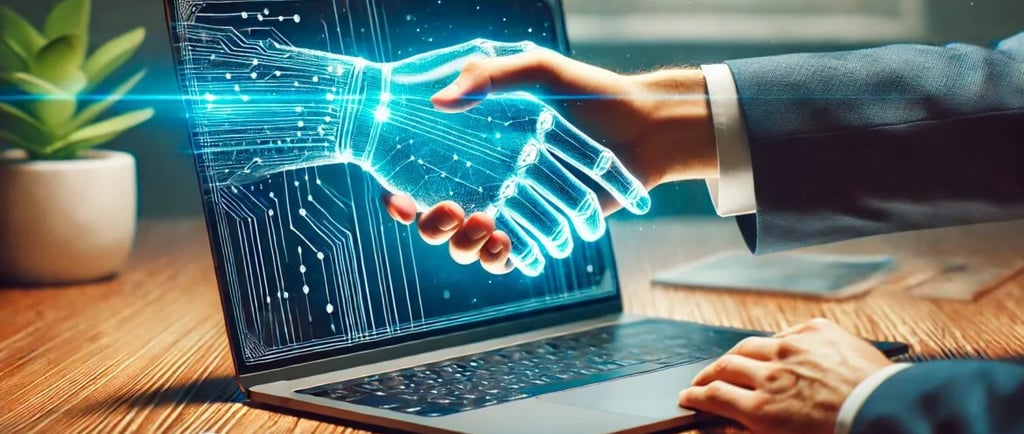items chosen one by one so you have the best option and save money on amazon (Links in articles)
🤖 AI vs Humans: The Shocking Skills Robots Are Already Better At in 2026
The Turning Point Has Arrived In 2026, the line between human and machine capabilities has never been blurrier. Artificial Intelligence (AI) is no longer just a futuristic concept — it’s embedded in our homes, workplaces, hospitals, cars, and even legal systems. While AI began as a tool to support human effort, many of today’s machines now outperform humans in critical and surprising ways. This article explores the top areas where AI has already surpassed human ability, based on real data and recent innovations. If you still believe robots are just assistants, read on — and prepare to be amazed.
5/14/20252 min leer


🧠 1. Data Analysis and Pattern Recognition
AI now processes and interprets massive datasets in seconds — a task that would take human teams weeks or months.
Key Sectors Affected:
Finance: AI-powered algorithms detect fraudulent activity faster and with fewer errors than human analysts.
Healthcare: AI models like Google’s Med-PaLM can now diagnose diseases with more accuracy than general practitioners.
Marketing: Predictive analytics tools anticipate customer behavior with incredible precision, driving conversions and ROI.
Why AI Wins:
Machine learning algorithms can detect micro-patterns in billions of data points that human brains simply can’t comprehend at scale.
🎨 2. Image and Voice Generation
AI art and voice models have crossed the uncanny valley. In 2026, tools like OpenAI’s Sora and ElevenLabs are creating realistic media that’s often indistinguishable from human-made content.
Examples:
Music & Voiceovers: AI voices are now used in Hollywood films and AAA video games.
Visual Design: AI platforms generate professional-level illustrations, UI mockups, and even fashion designs in seconds.
Deepfakes: While controversial, AI can now clone a person’s voice or face in real-time — for good or for ill.
Why AI Wins:
A machine can now replicate style, tone, rhythm, and voice faster and more consistently than most trained professionals.
✍️ 3. Writing and Coding
Thanks to large language models like GPT-4.5 and GPT-5, AI systems are now capable of writing everything from SEO-optimized blog posts to Python codebases — and often better than junior professionals.
Real-World Use Cases:
Journalism: AI writes sports summaries, weather reports, and financial updates in real time.
Customer Support: Chatbots handle millions of complex queries with 24/7 efficiency.
Software Development: Tools like GitHub Copilot help engineers build software faster by writing and refactoring code automatically.
Why AI Wins:
AI has read the equivalent of millions of textbooks, articles, and codebases. It writes with speed, consistency, and minimal fatigue.
🧪 4. Scientific Discovery and Drug Development
One of AI’s most powerful advantages is its ability to simulate and test hypotheses rapidly. In medicine and physics, this has accelerated breakthroughs that once took decades.
Major Advances:
AI-designed Proteins: DeepMind’s AlphaFold 3 predicts protein structures with near-perfect accuracy, unlocking new drug targets.
Climate Modeling: AI predicts extreme weather events and models climate change more precisely than traditional systems.
Quantum Research: AI is helping scientists optimize quantum circuits and discover new quantum materials.
Why AI Wins:
It’s not bound by human cognitive limits. AI runs millions of simulations in parallel, discovering patterns humans would never notice.
🚘 5. Driving and Autonomous Navigation
In 2026, Level 4 autonomy is a reality in multiple cities worldwide. Companies like Tesla, Waymo, and Cruise operate fully autonomous vehicles that outperform humans in safety and reaction time.
Key Areas of Deployment:
Urban Taxis: Self-driving cabs in San Francisco, Tokyo, and Dubai operate with fewer accidents than human drivers.
Logistics: AI-powered delivery trucks optimize routes and avoid traffic with real-time data.
Drones: Autonomous drones now handle warehouse inventory, medical supply transport, and surveillance with extreme precision.
Why AI Wins:
Machines don’t get tired, drunk, or distracted — and their reaction time is measured in milliseconds.
🧠 AI vs Human Comparison Table (2026)
SkillAI PerformanceHuman EquivalentData AnalysisMillions of data points/sec100s of rows per hourImage GenerationSeconds per assetHours/days for a designerWriting (basic content)Instant + SEO optimizedSlower, less consistentDrug DiscoveryMonthsYears or decadesDrivingFewer accidents per mileHigher crash rate
⚠️ What Humans Still Do Better (for Now)
While AI excels in logic, speed, and scale, it still lags in emotional intelligence and ethical reasoning.
Empathy & Morality: Machines can’t “feel” or truly understand human suffering.
Complex Creativity: While AI mimics, it rarely originates groundbreaking artistic visions.
Judgment Under Ambiguity: In nuanced, unfamiliar situations, humans adapt better — for now.
But the gap is closing fast.